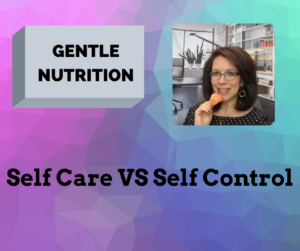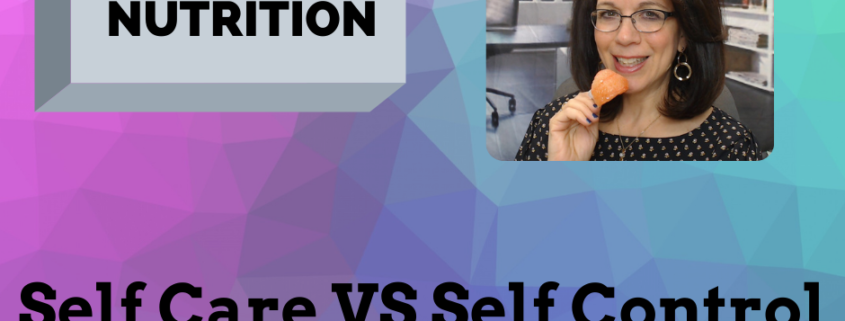Gentle Nutrition: Self-Care Versus Self Control
 One of the biggest misconceptions regarding Intuitive Eating is that nutrition guidelines and recommendations go out the window, or there is no focus on nutrition at all—it’s the “eating whatever you want when you want” mindset. However, this is far from the truth.
One of the biggest misconceptions regarding Intuitive Eating is that nutrition guidelines and recommendations go out the window, or there is no focus on nutrition at all—it’s the “eating whatever you want when you want” mindset. However, this is far from the truth.
Gentle nutrition is the tenth Intuitive Eating principle and reads a little something like this:
“Making food choices that honor your health and taste buds while making you feel well. Remember that you do not have to eat perfectly to be healthy. You do not suddenly get a nutrient deficiency or gain weight from one snack, one meal or one day of eating. It’s what you eat consistently over time that matters—progress not perfection is what counts.”
In order to reach a point of where gentle nutrition can be incorporated, there needs to be space created for a positive relationship with food that allows for this. Hence why there are nine principles that come before this that help you…
- Dismantle diet mentality
- Challenge the food police
- Get rid of diet rules
- Reframe limiting beliefs
- Accept your body
A solid foundation built on these principles needs to be in place for nutrition to be brought into the mix and approached in a non-diet way. This way you’re able to make choices from a loving, caring space and that consider all aspects of who you are (mentally, emotionally, and spiritually).
Difference Between Gentle Nutrition and Traditional Nutrition
The difference between nutrition from an Intuitive Eating approach vs. traditional approach is that nutrition is rooted in self-care and approaches it in a way that is sustainable.
Gentle nutrition is not rigid, restrictive, or filled with complications like traditional nutrition is often taught or perceived.
What does gentle nutrition look like? It’s different for everyone!
Here are some examples:
- Having an extremely busy schedule so you choose frozen or convenience foods, but you try adding some fresh vegetable to the dish.
- Following a gluten free eating style because you have celiac disease.
- Choosing low FODMAP foods because you struggle with IBS flare ups and foods with low fermentable carbs feel better and don’t trigger symptoms.
- Intentionally cooking your meals at home most days of the week.
- Not giving nutrition much of a thought but including as many fruits and vegetables into your day as you feel like.
Gentle nutrition is determined by you based on what feels good in your body!
Prioritizing nutrition to whatever degree you feel is your choice (it’s not a “should”). You are making the decisions to engage in nutrition in a way that makes you and your body feel good (which embodies the meaning of self-care). Waking up every day and choosing food that helps you work your best, feel your best, and be your best IS a form of self-care.
Gentle Nutrition: Self-Care, Not Self-Control
Gentle nutrition takes the approach that you’re going to choose to eat that salad because it makes you feel your best and you want to nourish yourself with foods that make you feel good (self-care).
Whereas traditional nutrition takes the approach that you need to eat that salad because it will help you lose weight, get you healthy, or you choose the salad because you feel ashamed to eat anything else, especially in front of others. It is what you “should” do (self-control).
Taking nutrition from this approach can be a challenge. If you feel yourself struggling with determining the difference between self-care and self-control when it comes to food choices, ask yourself these questions:
- Do my actions and decisions around food come from a place that feels balanced, free, elastic, and fluid, or do they feel rigid, controlled, and restrictive?
- If I make a choice that strays from nutrition recommendations, how do I feel?
Need support in Gentle Nutrition: Check out The Intuitive Nutrition Circle™ (aka The IN Circle™.) where you learn to integrate gentle nutrition with your Intuitive Eating practice.
Note: The Intuitive Eating Basics course is a pre-requisite for The IN Circle. But now you can get the Intuitive Eating Basics course AS PART of The IN Circle for a short time only at a special price. Click here for that option and use coupon code FOODPEACE at checkout!
Offer expires 4/1/22





